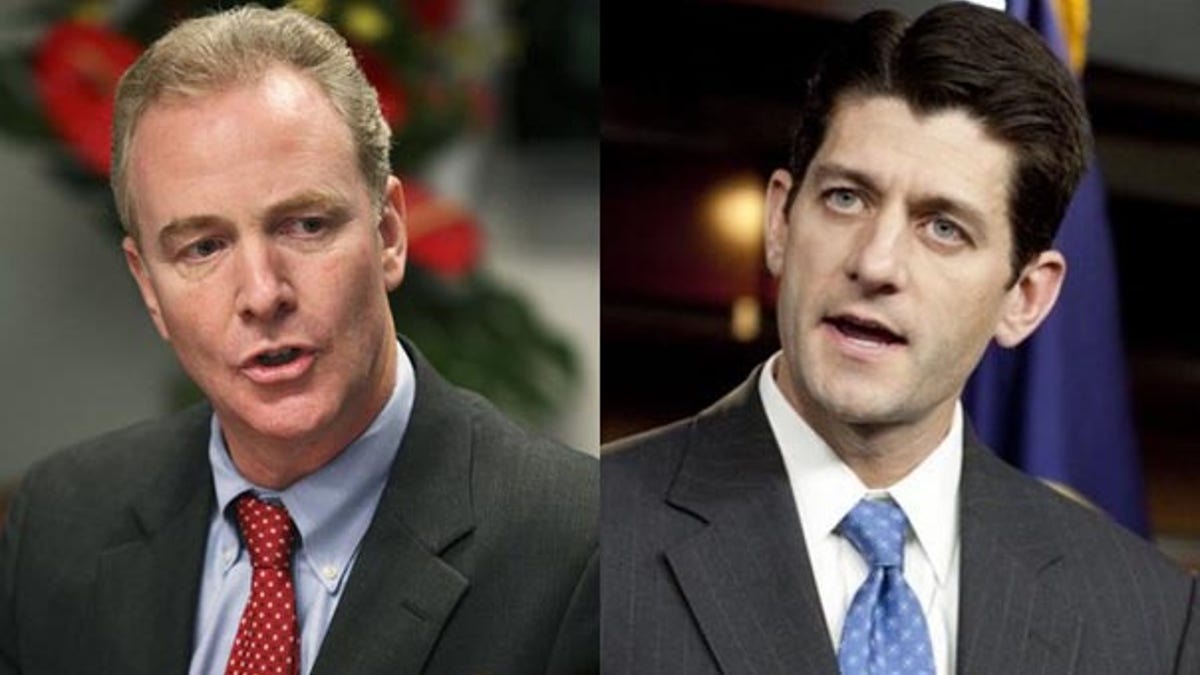
Reps. Chris Van Hollen, D-Md., left, and Paul Ryan, R-Wis. (Reuters/AP)
House Democrats are going to do whatever they can to bring up the estate tax for a separate vote as part of the tax compromise negotiations hitting Capitol Hill this week, but ultimately won't hold up the tax bill over the divisive issue, a top Democrat said Sunday.
Rep. Chris Van Hollen, D-Md., told "Fox News Sunday" that despite "some Democrats who will refuse to go along" with anything, the House "will have an opportunity to work its will."
"We're not going to hold this thing up at the end of the day," Van Hollen added, noting that it's "very reasonable for us to ask the wealthiest estates to pay their fair share."
He said he wants to put the question to the test, but repeated that Democrats would not block the whole package over the estate tax.
The estate tax currently is zeroed out as a result of Bush-era law, but if the law is left untouched, rates will jump up to 55 percent on estates worth $1 million or more. The compromise between Republicans and President Obama would lower that rate to 35 percent and lift the threshold to estates worth more than $5 million.
But House Democrats say they want a rate of 45 percent on estates worth $3.5 million or more.
"The main sticking point ... is this particular issue with the estate tax," said Van Hollen, who equated the new rate to giving $25 billion to 6,600 families.
Rep. Peter Welch, D-Vt., who has led the Democratic opposition in the House to the tax rate deal, described it as a $68 billion cut for 38,000 families "in a country of 300 million." Welch said that he thinks Obama made the deal "in the seventh inning when we had a chance to negotiate a better deal."
"I'd like to see us having separate votes for extending tax cuts for middle America and a separate vote on the estate tax," Welch said later in the day, noting that he wants the debate so people can see what the stakes are, including the cost of the $120 billion one-year payroll tax holiday.
The potential that the bill could get through the House sounded like news to Rep. Paul Ryan, R-Wis., the presumptive chairman of the House Budget Committee, who said efforts to hold up the bill over the estate tax is akin to the "hostage-taking discussion" used last week to describe Republicans who insist on keeping the top income tax rate at 35 percent.
Ryan, who appeared with Van Hollen, said he too doesn't like parts of the bill, but "the worst thing we can do is hit this economy with an across-the-board tax cut."
"The answer is no, we're not interested in changing this deal. We're interested in passing this through," he said, adding that fighting over the estate tax rate is a bad plan.
"Class warfare might make for good politics, but it makes for rotten economics," he said.
Ryan also argued that the Congressional Budget Office's claiming the legislation adds $858 billion to the deficit works from the assumption that $544 billion is the "cost" of keeping tax rates the same while $313 billion is attributed to new spending.
"I find it sort of interesting that after this massive spending spree that took place over the last two years, the creation of two new health care entitlements, now there's concern about deficits when they have the chance of raising taxes. We're not interested in raising taxes," he said. "We don't want to see spending. We're going to come out of the gates going after spending."
Elsewhere, President Obama senior adviser David Axelrod said he thinks the negotiations are done on Capitol Hill.
"I think every single person in that building does not want taxes to go up on January 1st, does not want to see 2 million people lose their unemployment insurance. Everybody understands what the implications for the economy would be -- every economist has spoken to it -- if that package doesn't move forward. So I believe that there will be a coming together around it," Axelrod said on ABC's "This Week."




